- Home
- Brandon Sanderson
Edgedancer Page 10
Edgedancer Read online
Page 10
Wyndle made a face from vines beside her. “Mistress? Was this all … was this all so you could steal his food?”
“Yeph,” Lift said, then swallowed. “Course it is.” She took another bite. That’d show him.
“Oh. Of course.” He sighed deeply. “I suppose this is … this is pleasant, then. Yes. No swinging about of innocent spren, stabbing them into people and the like. Just … just stealing some food.”
“Darkness’s food.” She’d stolen from a palace, and the starvin’ emperor of Azir. She’d needed something interesting to try next.
It felt good to finally get enough food to fill her stomach. One of the pancakes was salty, with chopped-up vegetables. Another tasted sweet. The third variety was fluffier, almost without any substance to it, though there was some kind of sauce to dip it in. She slurped that down—who had time for dipping?
She ate every scrap, then settled back against the wall, smiling.
“So, we came all this way,” Wyndle said, “and tracked the most dangerous man we’ve ever met, merely so you could steal his breakfast. We didn’t come here to do … to do anything more, then?”
“Do you want to do something more?”
“Storms, no!” Wyndle said. He twisted his little vine face around, looking toward the hallway. “I mean … every moment we spend in here is dangerous.”
“Yup.”
“We should run. Go found a farm, like I said. Leave him behind, though he’s likely tracking someone in this city. Someone like us, someone who can’t fight him. Someone he will murder before they even start to grasp their powers…”
They sat in the room, empty tray beside them. Lift felt her awesomeness begin to stir within her again.
“So,” she asked. “Guess we go spy on them, eh?”
Wyndle whimpered, but—shockingly—nodded.
9
“Just try not to die too violently, mistress,” Wyndle said as she crept closer to the sounds of people talking. “A nice rap on the head, rather than a disemboweling.”
That voice was definitely Darkness. The sound of it gave her chills. When the man had confronted her in the Azish palace, he’d been dispassionate, even as he half apologized for what he was about to do.
“I hear that suffocation is nice,” Wyndle said. “Though in such a case, don’t look at me as you expire. I’m not sure I could handle it.”
Remember the girl in the market. Steady.
Storms, her hands were trembling.
“I’m not sure about falling to your death,” Wyndle added. “Seems like it might be messy, but at the same time at least there wouldn’t be any stabbing.”
The hallway ended at a large chamber lit by diamonds that gave it a calm, easy light. Not chips, not even spheres. Larger, unset gemstones. Lift crouched by the half-open door, hidden in shadows.
Darkness—wearing a stiff white shirt—paced before two underlings in uniforms in black and white, with swords at their waists. One was a Makabaki man with a round, goofish face. The other was a woman with skin a shade lighter—she looked like she might be Reshi, particularly with that long dark hair she kept in a tight braid. She had a square face, strong shoulders, and way too small a nose. Like she’d sold hers off to buy some new shoes, and was using one she’d dug out of the trash as a replacement.
“Your excuses do not befit those who would join our order,” Darkness was saying. “If you would earn the trust of your spren, and take the step from initiate to Shardbearer, you must dedicate yourselves. You must prove your worth. Earlier today I followed a lead that each of you missed, and have discovered a second offender in the city.”
“Sir!” the Reshi woman said. “I prevented an assault in an alleyway! A man was being accosted by thugs!”
“While this is well,” Darkness said, still pacing back and forth in a calm, even stroll, “we must be careful not to be distracted by petty crimes. I realize that it can be difficult to remain focused when confronted by a fracture of the codes that bind society. Remember that greater matters, and greater crimes, must be our primary concern.”
“Surgebinders,” the woman said.
Surgebinders. People like Lift, people with awesomeness, who could do the impossible. She hadn’t been afraid to sneak into a palace, but huddled by that door—looking in at the man she had named Darkness—she found herself terrified.
“But…” said the male initiate. “Is it really … I mean, shouldn’t we want them to return, so we won’t be the only order of Knights Radiant?”
“Unfortunately, no,” Darkness said. “I once thought as you, but Ishar made the truth clear to me. If the bonds between men and spren are reignited, then men will naturally discover the greater power of the oaths. Without Honor to regulate this, there is a small chance that what comes next will allow the Voidbringers to again make the jump between worlds. That would cause a Desolation, and even a small chance that the world will be destroyed is a risk that we cannot take. Absolute fidelity to the mission Ishar gave us—the greater law of protecting Roshar—is required.”
“You’re wrong,” a voice whispered from the darkness. “You may be a god … but you’re still wrong.”
Lift nearly jumped clear out of her own skin. Storms! There was a guy sitting just inside the doorway, right next to where she was hiding. She hadn’t seen him—she’d been too fixated on Darkness.
He sat on the floor, wearing tattered white clothing. His hair was short, a brown fuzz, as if he’d kept it shaved until recently. He had pale, ghostly skin, and held a long sword in a silvery sheath, pommel resting against his shoulder, length stretching alongside his body and legs. He held his arms draped around the sheath, as if it were a child’s toy to hug.
He shifted in his place, and … storms, he left a soft white afterimage behind him, like you get when staring at a bright gemstone for too long. It faded away in a moment.
“They’re already back,” he whispered, speaking with a smooth, airy Shin accent. “The Voidbringers have already returned.”
“You are mistaken,” Darkness said. “The Voidbringers are not back. What you saw on the Shattered Plains are simply remnants from millennia ago. Voidbringers who have been hiding among us all this time.”
The man in white looked up, and Lift shied away. His movement left another afterimage that glowed briefly before fading. Storms. White clothing. Strange powers. Shin man with a bald head. Shardblade.
This was the starvin’ Assassin in White!
“I saw them return,” the assassin whispered. “The new storm, the red eyes. You are wrong, Nin-son-God. You are wrong.”
“A fluke,” Darkness said, his voice firm. “I contacted Ishar, and he assured me it is so. What you saw are a few listeners who remain from the old days, ones free to use the old forms. They summoned a cluster of Voidspren. We’ve found remnants of them on Roshar before, hiding.”
“The storm? The new storm, of red lightning?”
“It means nothing,” Darkness said. He did not seem to mind being challenged. He didn’t seem to mind anything. His voice was perfectly even. “An oddity, to be sure.”
“You’re wrong. So wrong…”
“The Voidbringers have not returned,” Darkness said firmly. “Ishar has promised it, and he will not lie. We must do our duty. You are questioning, Szeth-son-Neturo. This is not good; this is weakness. To question is to accept a descent into inactivity. The only path to sanity and action is to choose a code and to follow it. This is why I came to you in the first place.”
Darkness turned, striding past the others. “The minds of men are fragile, their emotions mutable and often unpredictable. The only path to Honor is to stick to your chosen code. This was the way of the Knights Radiant, and is the way of the Skybreakers.”
The man and woman standing nearby both saluted. The assassin just bowed his head again, closing his eyes, holding to that strange silver-sheathed Shardblade.
“You said that there is a second Surgebinder in the city,” the woman said. “We
can find—”
“She is mine,” Darkness said evenly. “You will continue your mission. Find the one who has been hiding here since we arrived.” He narrowed his eyes. “If we don’t stop one, others will congregate. They clump together. I have often found them making contact with one another, these last five years, if I leave them alone. They must be drawn to each other.”
He turned toward his two initiates; he seemed to ignore the assassin except when spoken to. “Your quarry will make mistakes—they will break the law. The other orders always did consider themselves beyond the reach of the law. Only the Skybreakers ever understood the importance of boundaries. Of picking something external to yourself and using it as a guide. Your minds cannot be trusted. Even my mind—especially my mind—cannot be trusted.
“I have given you enough help. You have my blessing and you have our commission granting us authority to act in this city. You will find the Surgebinder, you will discover their sins, and you will bring them judgment. In the name of all Roshar.”
The two saluted again, and the room suddenly darkened. The woman began glowing with a phantom light, and she blushed, looking sheepishly toward Darkness. “I’ll find them, sir! I have an investigation in progress.”
“I have a lead too,” the man said. “I’ll have the information by tonight for certain.”
“Work together,” Darkness said. “This is not a competition. It is a test to measure competence. I’m giving you until sunset, but after that I can wait no longer. Now that others have begun arriving, the risk is too great. At sunset, I will deal with the issue myself.”
“Bollocks,” Lift whispered. She shook her head, then scuttled back along the hallway, away from the group of people.
“Wait,” Wyndle said, following. “Bollocks? I thought you claimed you didn’t say words like—”
“They’ve all got ’em,” Lift said. “’Cept the girl, though with that face I can’t be certain. Anyway, what I said wasn’t crass, ’cuz it was just an observation.” She hit the intersection of corridors, and peeked to the left. The old man on watch was dozing. That let Lift slip across, into the room where she’d first entered. She climbed out into the tree, then closed the shutters.
In seconds she’d run around a corner into an alleyway, where she let herself slide down until she was sitting with her back against the stone, her heart pounding. Farther into the alleyway here, a family ate pancakes in a somewhat nice shanty. It had two whole walls.
“Mistress?” Wyndle said.
“I’m hungry,” she complained.
“You just ate!”
“That was catching me up for spending so much getting into that starvin’ building.” She squeezed her eyes closed, containing her worry.
Darkness’s voice was so cold.
But they’re like me. They glow like me. They’re … awesome, like I am? What in Damnation is going on?
And the Assassin in White. Was he going to go off and kill Gawx?
“Mistress?” Wyndle coiled around her leg. “Oh, mistress. Did you hear what they called him? Nin? That’s a name of Nalan, the Herald! That can’t be true. They went away, didn’t they? Even we have legends about that. If that creature is truly one of them … oh, Lift. What are we going to do?”
“I don’t know,” she whispered. “I don’t know. Storms … why am I even here?”
“I believe I’ve been asking that since—”
“Shut it, Voidbringer,” she said, forcing herself to roll over and get to her knees. Deeper into the cramped alley, the father of the family reached for a cudgel while the wife tugged the curtain closed on the front of their hovel.
Lift sighed, then went wandering back toward the immigrant quarter.
10
When she arrived at the orphanage, Lift finally figured out why it had been set up next to this open space at the mouth of the alleyway. The orphanage caretaker—the Stump, as she’d been called—had opened the doors and let the children out. They played here, in the most boring playground ever. A set of amphitheater steps and some open floor.
The children seemed to love it. They ran up and down the steps, laughing and giggling. Others sat in circles on the ground, playing games with painted pebbles. Laughterspren—like little silver fish that zipped through the air, this way and that—danced in the air some ten feet up, a whole school of the starvin’ things.
There were lots of children, younger on average than Lift had assumed. Most, as she had been able to guess, were the kind that were different in the head, or they were missin’ an arm or leg. Things like that.
Lift idled near the wide alleyway mouth, near where two blind girls played a game. One would drop rocks of a variety of sizes and shapes, and the other would try to guess which was which, based on how they sounded when they hit the ground. The group of old men and women in shiquas from the day before had again gathered at the back of the half-moon amphitheater seats, chatting and watching the children play.
“I thought you said orphanages were miserable,” Wyndle said, coating the wall beside her.
“Everyone gets happy for a little while when you let them go outside,” Lift said, watching the Stump. The wizened old lady was scowling as she pulled a cart through the doors toward the amphitheater. More clemabread rolls. Delightful. Those were only slightly better than gruel, which was only slightly better than cold socks.
Still, Lift joined the others who got in line to accept their roll. When her turn came, the Stump pointed to a spot beside the cart and didn’t speak a word to her. Lift stepped aside, lacking the energy to argue.
The Stump made sure every child got a roll, then studied Lift before handing her one of the last two. “Your second meal of three.”
“Second!” Lift snapped. “I ain’t—”
“You got one last night.”
“I didn’t ask for it!”
“You ate it.” The Stump pushed the cart away, eating the last of the rolls herself.
“Storming witch,” Lift muttered, then found a spot on the stone seats. She sat apart from the regular orphans; she didn’t want to be talked at.
“Mistress,” Wyndle said, climbing the steps to join her. “I don’t believe you when you say you left Azir because they were trying to dress you in fancy clothing and teach you to read.”
“Is that so,” she said, chewing on her roll.
“You liked the clothing, for one thing. And when they tried to give you lessons, you seemed to enjoy the game of always being gone when they came looking. They weren’t forcing you into anything; they were merely offering opportunities. The palace was not the stifling experience you imply.”
“Maybe not for me,” she admitted.
It was for Gawx. They expected all kinds of things of the new emperor. Lessons, displays. People came to watch him eat every meal. They even got to watch him sleeping. In Azir, the emperor was owned by the people, like a friendly stray axehound that seven different houses fed, all claiming her as their own.
“Maybe,” Lift said, “I just didn’t want people expecting so much from me. If you get to know people too long, they’ll start depending on you.”
“Oh, and you can’t bear responsibility?”
“Course I can’t. I’m a starvin’ street urchin.”
“One who came here chasing down what appears to be one of the Heralds themselves, gone mad and accompanied by an assassin who has murdered multiple world monarchs. Yes, I believe that you must be avoiding responsibility.”
“You giving me lip, Voidbringer?”
“I think so? Honestly, I don’t know what that term means, but judging by your tone, I’d say that I’m probably giving you lip. And you probably deserve it.”
She grunted in response, chewing on her food. It tasted terrible, as if it had been left out all night.
“Mama always told me to travel,” Lift said. “And go places. While I’m young.”
“And that’s why you left the palace.”
“Dunno. Maybe.”
“Utter nonsense. Mistress, what is it really? Lift, what do you want?”
She looked down at the half-eaten roll in her hand.
“Everything is changing,” she said softly. “That’s okay. Stuff changes. It’s just that, I’m not supposed to. I asked not to. She’s supposed to give you what you ask.”
“The Nightwatcher?” Wyndle asked.
Lift nodded, feeling small, cold. Children played and laughed all around, and for some reason that only made her feel worse. It was obvious to her, though she’d tried ignoring it for years, that she was taller than she’d been when she’d first sought out the Old Magic three years ago.
She looked beyond the kids, toward the street passing out front. A group of women bustled past, carrying baskets of yarn. A prim Alethi man strode in the other direction, with straight black hair and an imperious attitude. He was at least a foot taller than anyone else on the street. Workers moved along, cleaning the street, picking up trash.
In the alleyway mouth, the Stump had deposited her cart and was disciplining a child who had started hitting others. At the back of the amphitheater seats, the old men and women laughed together, one pouring cups of tea to pass around.
They all seemed to just … know what to do. Cremlings knew to scuttle, plants knew to grow. Everything had its place.
“The only thing I’ve ever known how to do was hunt food,” Lift whispered.
“What’s that, mistress?”
It had been hard, at first. Feeding herself. Over time, she’d figured out the tricks. She’d gotten good at it.
But once you weren’t hungry all the time, what did you do? How did you know?
Someone poked at her arm, and she turned to see that a kid had scooted up beside her—a lean boy with his head shaved. He pointed at her half-eaten roll and grunted.
She sighed and gave it to him. He ate eagerly.
“I know you,” she said, cocking her head. “You’re the one whose mother dropped him off last night.”
“Mother,” he said, then looked at her. “Mother … come back when?”

 Steelheart
Steelheart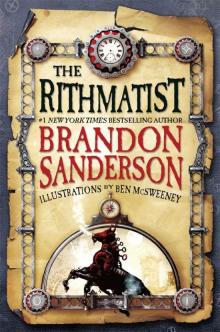 The Rithmatist
The Rithmatist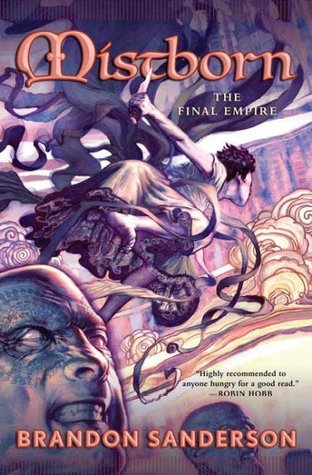 Mistborn: The Final Empire
Mistborn: The Final Empire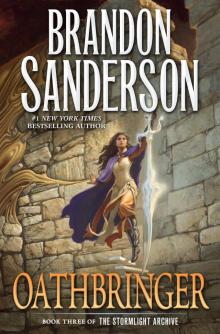 Oathbringer
Oathbringer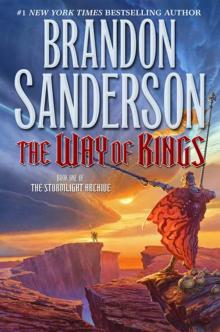 The Way of Kings
The Way of Kings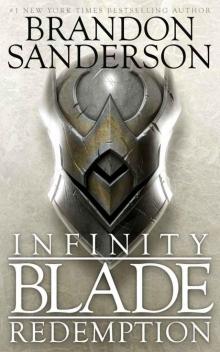 Redemption
Redemption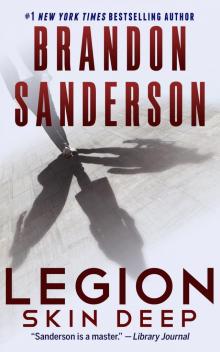 Skin Deep
Skin Deep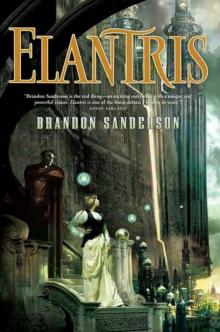 Elantris
Elantris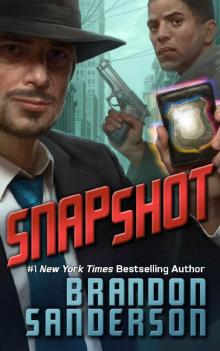 Snapshot
Snapshot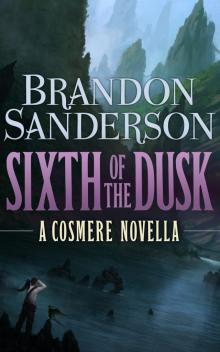 Sixth of the Dusk (Cosmere)
Sixth of the Dusk (Cosmere)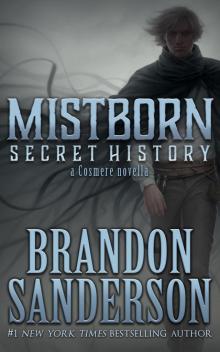 Mistborn: Secret History
Mistborn: Secret History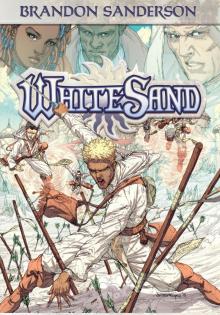 White Sand, Volume 1
White Sand, Volume 1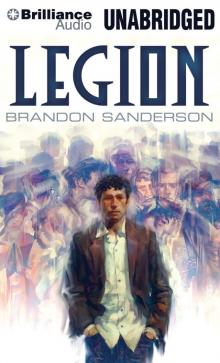 Legion
Legion The Well of Ascension
The Well of Ascension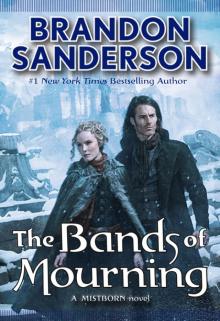 The Bands of Mourning
The Bands of Mourning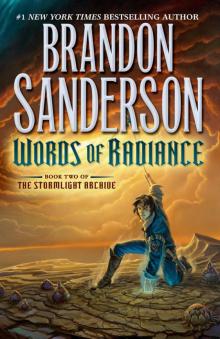 Words of Radiance
Words of Radiance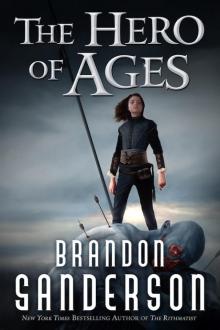 The Hero of Ages
The Hero of Ages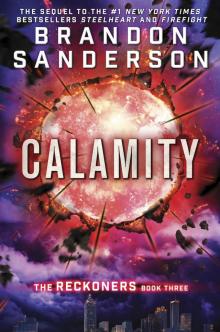 Calamity
Calamity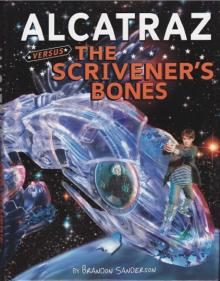 Alcatraz Versus the Scrivener's Bones
Alcatraz Versus the Scrivener's Bones The Alloy of Law
The Alloy of Law The Emperors Soul
The Emperors Soul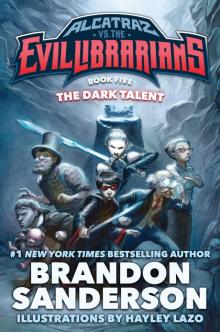 The Dark Talent
The Dark Talent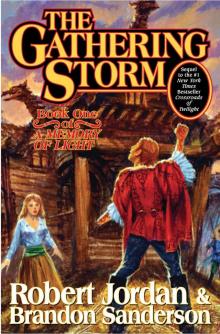 The Gathering Storm
The Gathering Storm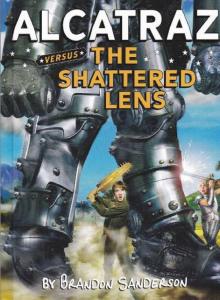 Alcatraz Versus the Shattered Lens
Alcatraz Versus the Shattered Lens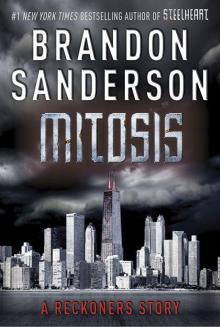 Mitosis
Mitosis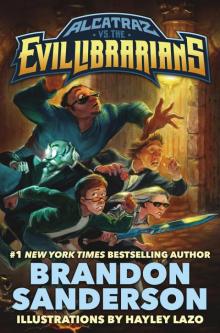 Alcatraz vs. The Evil Librarians
Alcatraz vs. The Evil Librarians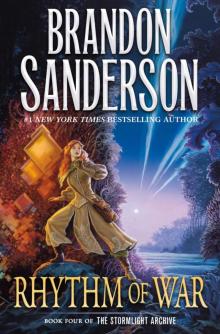 Rhythm of War (9781429952040)
Rhythm of War (9781429952040)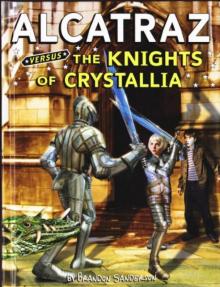 Alcatraz Versus the Knights of Crystallia
Alcatraz Versus the Knights of Crystallia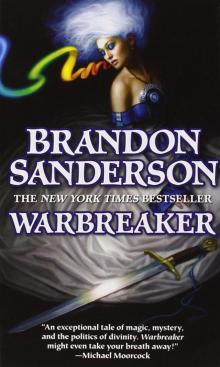 Warbreaker
Warbreaker Firstborn
Firstborn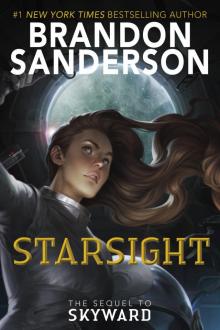 Starsight
Starsight Edgedancer
Edgedancer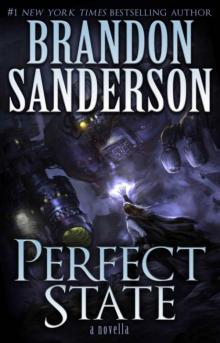 Perfect State
Perfect State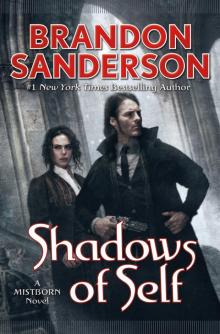 Shadows of Self
Shadows of Self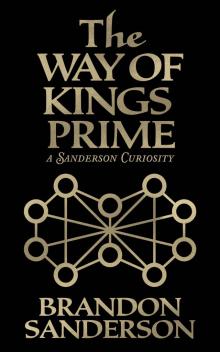 The Way of Kings Prime
The Way of Kings Prime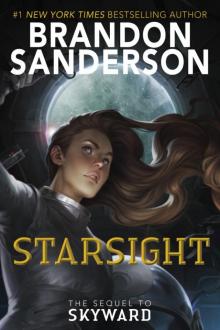 Starsight (US)
Starsight (US)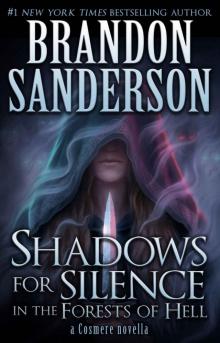 Shadows for Silence in the Forests of Hell
Shadows for Silence in the Forests of Hell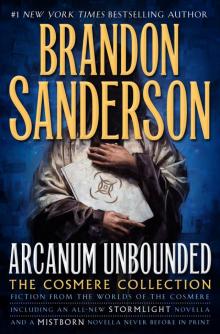 Arcanum Unbounded: The Cosmere Collection
Arcanum Unbounded: The Cosmere Collection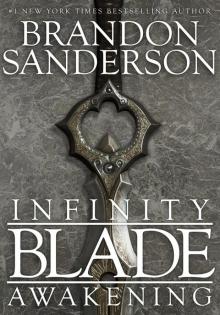 Awakening
Awakening Firefight
Firefight Dawnshard
Dawnshard Defending Elysium
Defending Elysium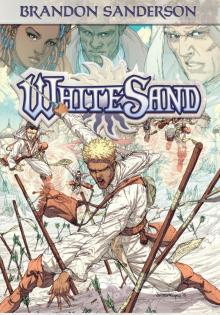 White Sand
White Sand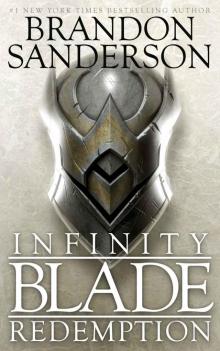 Infinity Blade: Redemption
Infinity Blade: Redemption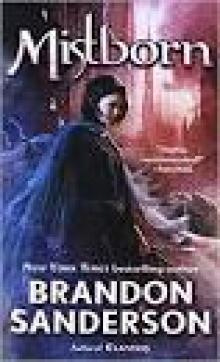 The Final Empire
The Final Empire Skyward
Skyward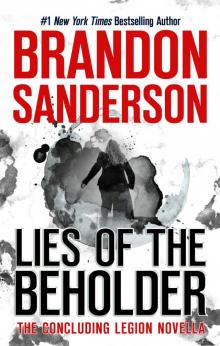 Lies of the Beholder
Lies of the Beholder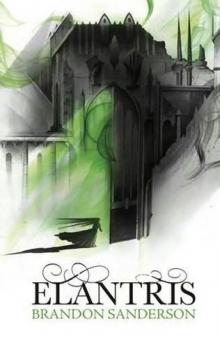 Elantris e-1
Elantris e-1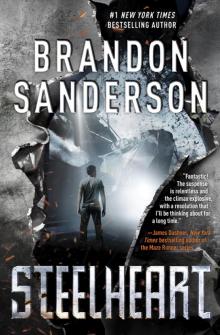 Steelheart r-1
Steelheart r-1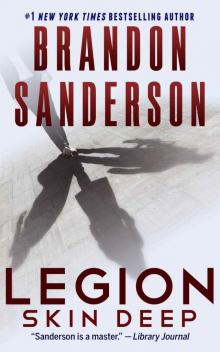 Legion: Skin Deep
Legion: Skin Deep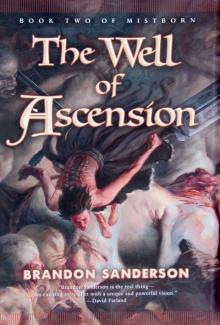 Well of Ascension
Well of Ascension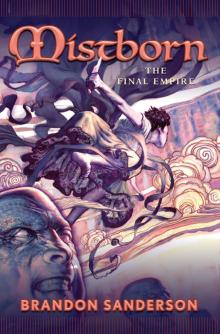 Mistborn
Mistborn Alcatraz versus the Evil Librarians
Alcatraz versus the Evil Librarians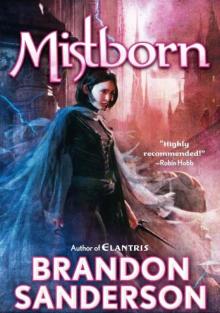 The Final Empire m-1
The Final Empire m-1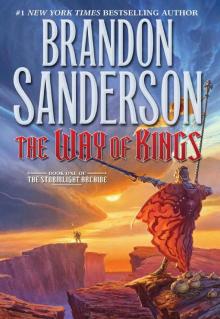 The Way of Kings (Stormlight Archive, The)
The Way of Kings (Stormlight Archive, The)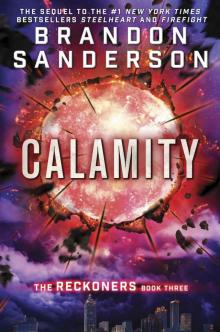 Calamity (The Reckoners)
Calamity (The Reckoners) Legion and the Emperor's Soul
Legion and the Emperor's Soul Legion: The Many Lives of Stephen Leeds
Legion: The Many Lives of Stephen Leeds The Mistborn Trilogy
The Mistborn Trilogy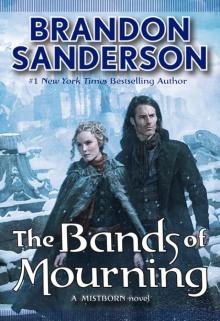 Bands of Mourning
Bands of Mourning Alcatraz
Alcatraz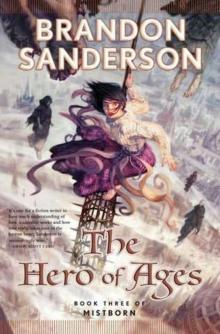 The Hero of Ages m-3
The Hero of Ages m-3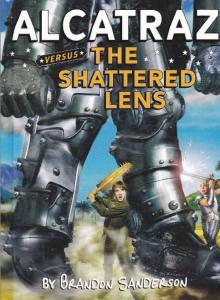 Alcatraz vs. the Shattered Lens
Alcatraz vs. the Shattered Lens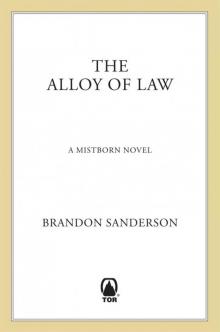 The Alloy of Law: A Mistborn Novel
The Alloy of Law: A Mistborn Novel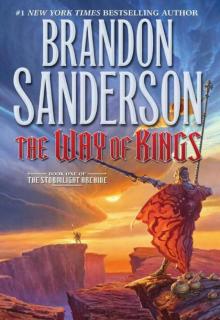 The Way of Kings sa-1
The Way of Kings sa-1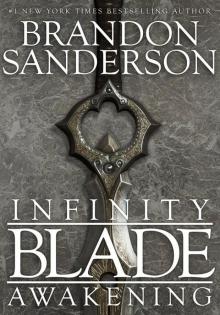 Infinity Blade: Awakening
Infinity Blade: Awakening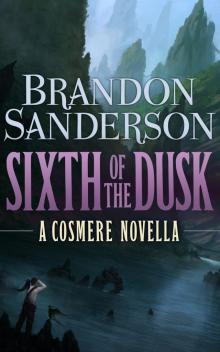 Sixth of the Dusk
Sixth of the Dusk The Stormlight Archive
The Stormlight Archive The Aether of Night
The Aether of Night